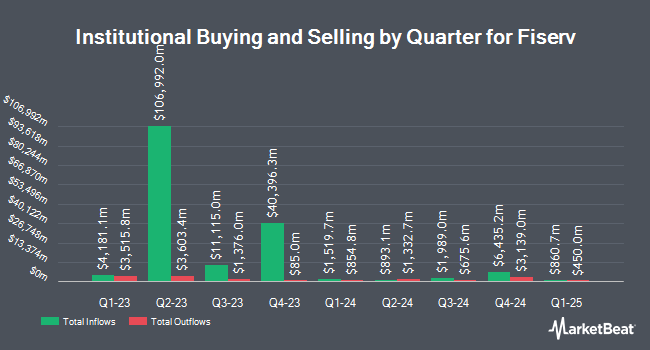TD Private Client Wealth LLC boosted its holdings in Fiserv, Inc. (NYSE:FI - Free Report) by 35.4% during the 4th quarter, according to its most recent disclosure with the Securities and Exchange Commission (SEC). The fund owned 4,440 shares of the business services provider's stock after buying an additional 1,160 shares during the quarter. TD Private Client Wealth LLC's holdings in Fiserv were worth $912,000 at the end of the most recent quarter.
A number of other hedge funds and other institutional investors also recently bought and sold shares of the business. FMR LLC boosted its holdings in shares of Fiserv by 17.8% in the 3rd quarter. FMR LLC now owns 9,442,476 shares of the business services provider's stock valued at $1,696,341,000 after buying an additional 1,427,664 shares in the last quarter. Sanders Capital LLC purchased a new position in shares of Fiserv during the third quarter worth about $764,543,000. Bank of New York Mellon Corp increased its position in shares of Fiserv by 4.7% during the fourth quarter. Bank of New York Mellon Corp now owns 3,711,072 shares of the business services provider's stock worth $762,328,000 after purchasing an additional 164,949 shares in the last quarter. Charles Schwab Investment Management Inc. lifted its holdings in shares of Fiserv by 2.6% in the 4th quarter. Charles Schwab Investment Management Inc. now owns 3,620,785 shares of the business services provider's stock valued at $743,782,000 after purchasing an additional 90,475 shares during the last quarter. Finally, Raymond James Financial Inc. purchased a new position in Fiserv during the 4th quarter worth approximately $614,982,000. 90.98% of the stock is currently owned by institutional investors and hedge funds.
Insider Buying and Selling at Fiserv
In other news, COO Guy Chiarello sold 45,000 shares of the company's stock in a transaction on Thursday, February 20th. The stock was sold at an average price of $235.55, for a total value of $10,599,750.00. Following the sale, the chief operating officer now directly owns 227,711 shares in the company, valued at $53,637,326.05. This represents a 16.50 % decrease in their ownership of the stock. The sale was disclosed in a legal filing with the Securities & Exchange Commission, which is available through the SEC website. Insiders own 0.75% of the company's stock.
Analyst Ratings Changes
A number of equities research analysts have weighed in on the company. BMO Capital Markets boosted their price objective on Fiserv from $233.00 to $260.00 and gave the company an "outperform" rating in a research note on Thursday, February 6th. KeyCorp increased their price target on shares of Fiserv from $250.00 to $270.00 and gave the stock an "overweight" rating in a research note on Thursday, February 6th. Susquehanna upped their target price on shares of Fiserv from $230.00 to $270.00 and gave the company a "positive" rating in a report on Monday, February 10th. Oppenheimer increased their target price on shares of Fiserv from $214.00 to $239.00 and gave the stock an "outperform" rating in a research note on Thursday, December 19th. Finally, StockNews.com started coverage on Fiserv in a research note on Sunday. They set a "buy" rating for the company. Two analysts have rated the stock with a hold rating, twenty-one have assigned a buy rating and two have assigned a strong buy rating to the stock. According to MarketBeat, the company has an average rating of "Buy" and a consensus target price of $242.32.
Check Out Our Latest Research Report on Fiserv
Fiserv Price Performance
FI stock traded down $2.37 during midday trading on Thursday, hitting $219.32. 3,964,473 shares of the stock were exchanged, compared to its average volume of 2,516,084. The stock's 50-day moving average price is $221.58 and its 200-day moving average price is $207.28. The company has a debt-to-equity ratio of 0.86, a quick ratio of 1.07 and a current ratio of 1.06. The stock has a market cap of $123.10 billion, a price-to-earnings ratio of 40.69, a PEG ratio of 1.52 and a beta of 0.93. Fiserv, Inc. has a fifty-two week low of $145.98 and a fifty-two week high of $238.59.
Fiserv (NYSE:FI - Get Free Report) last released its quarterly earnings results on Wednesday, February 5th. The business services provider reported $2.51 earnings per share (EPS) for the quarter, topping the consensus estimate of $2.48 by $0.03. Fiserv had a return on equity of 17.93% and a net margin of 15.31%. Research analysts predict that Fiserv, Inc. will post 10.23 earnings per share for the current year.
Fiserv declared that its board has initiated a share buyback plan on Thursday, February 20th that permits the company to repurchase 60,000,000 outstanding shares. This repurchase authorization permits the business services provider to purchase shares of its stock through open market purchases. Stock repurchase plans are generally an indication that the company's management believes its shares are undervalued.
Fiserv Company Profile
(
Free Report)
Fiserv, Inc, together with its subsidiaries, provides payments and financial services technology services in the United States, Europe, the Middle East and Africa, Latin America, the Asia-Pacific, and internationally. It operates through Merchant Acceptance, Financial Technology, and Payments and Network segments.
See Also

Before you consider Fiserv, you'll want to hear this.
MarketBeat keeps track of Wall Street's top-rated and best performing research analysts and the stocks they recommend to their clients on a daily basis. MarketBeat has identified the five stocks that top analysts are quietly whispering to their clients to buy now before the broader market catches on... and Fiserv wasn't on the list.
While Fiserv currently has a Buy rating among analysts, top-rated analysts believe these five stocks are better buys.
View The Five Stocks Here
Almost everyone loves strong dividend-paying stocks, but high yields can signal danger. Discover 20 high-yield dividend stocks paying an unsustainably large percentage of their earnings. Enter your email to get this report and avoid a high-yield dividend trap.
Get This Free Report
Like this article? Share it with a colleague.
Link copied to clipboard.